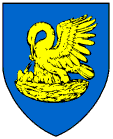
LIVES OF THE BISHOPS OF EXETER
RICHARD FOX. - To this chief of all the confidential friends and counsellors of King Henry VII., the temporalities of this vacant see were granted on 2nd April, 1487, and he was consecrated shortly after (perhaps at Norwich, on 8th April, by Archbishop Morton); but we cannot recover the date. He was the son of Thomas and Helen Fox of Ropesley near Grantham, and by his natural abilities, cultivated with indefatigable industry at Magdalen College, Oxford, and improved by acute observation of men and manners, he became the architect of his fame and fortune. Shortly after his consecration King Henry sent him as ambassador to the court of Scotland, where he negotiated the marriage of Margaret, his sovereign's eldest daughter, with James IV., King of the Scots - an event which in the progress of time happily united the two crowns under one head, and has even consolidated the two kingdoms under one empire. Before his departure, the bishop appointed William Sylke, LL.D., a leading dignitary of the cathedral of Exeter, to be his vicar general. The letters are dated from Kenilworth 31st May, 1487. From his Register we cannot collect that he ever visited this diocese; so occupied was he with embassies abroad, or with the duties of Keeper of the Privy Seal. From Sanford's 'Genealogical History,' p. 449, we learn that King Henry VIII., who was born at Greenwich, 28th June, 1491, was baptised in the parish church of St. Alphege there by our bishop, and that his immediate predecessor in this see, Peter Courtenay Bishop of Winchester, and John de Vere Earl of Oxford, stood godfathers. On 8th Feb. 1492, he was translated to Bath and Wells, and the temporalities of that see were restored to him on 4th May following: two years later Durham had the honour of receiving him for her bishop; finally he was translated to Winchester on 1st October, 1501. Hoker ('MS.' p. 336) affirms that the king offered him the archbishopric of Canterbury, which he declined, and that the king moreover chose him to be godfather to his second son and successor, King Henry VIII. This last-mentioned sovereign, on 30th January, 1511, at his request, confirmed all the grants of his royal predecessors to the see of Winchester.
This highly-gifted statesman retained the office of Lord Keeper of the Privy Seal, and continued to negotiate treaties until the infirmities of old age and increasing weakness of sight, which terminated in total blindness, compelled him to retire from the cabinet, and induced him to prepare himself for eternity. Yet he strongly and successfully exerted his influence during the summer of 1523, against the exorbitant demand of the crown of fifty per cent. on the yearly income of all clerical benefices. Before his death, which took place on 5th October, 1528, he nobly devoted his fortune to the founding of Corpus Christi College, Oxford, and grammar schools at Grantham and at Taunton. That he was hastily buried is certain ; his coffin of plain oak-boards was fastened with pegs of wood. And when his grave was opened within his beautiful chantry in Winchester Cathedral, on 28th January, 1820, the following memorandum on parchment, inclosed in a leaden box, was found between his feet :- " Quinto die Octobris, anno Domini millimo quingentesimo vicesimo octavo, obiit et sepultus est Richardus Fox, hujus Ecclesite Epus, qui hanc rexit ecclesiam septem et viginti annis integre." Harpsfield, in his 'Hist. Eccl. Angl.' p. 644, relates that the venerable prelate lost his sight ten years before his death, and that he himself, whilst a boy in Winchester College, recollects to have been present at his dirge and funeral. Hoker, above quoted, pronounces the bishop to have been "such a man for wisdom, knowledge, learning, and truth, that he left not his lyke at that time after him." Indeed it would require a volume to enumerate his services to his prince and country; and the considerate application of his wealth and influence to perpetuate works of charity and to diffuse the blessings of education, will immortalise his memory.
Arms: - Azure, a Pelican in her nest feeding her young with her blood, or.
